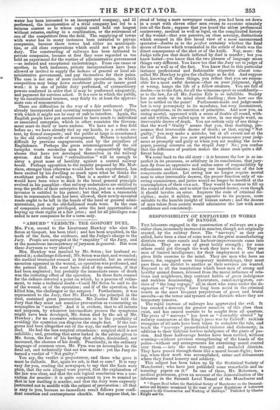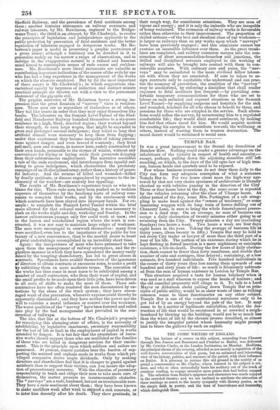RESPONSIBILITY OF EMPLOYERS IN WORKS OF DANGER.
THE labourers engaged in the construction of railways are a pe- culiar class, immensely increased in number, though not originally created, by the railway furor. The "navveys," as they are called, have been a class of some note in the great manufacturing districts ever since canals and harbour-improvements came into fashion. They are men of great bodily strength ; for none others could get through the work they have to do. They are men of limited intelligence; for their employment is one that gives little exercise to the mind. They are men who have no homes; for, engaged upon temporary undertakings, they must pass from one district to another as their services are wanted. Exposed to all the temptations which beset men of strong and healthy animal frames, released from the moral influence of rela- tions and neighbours, they contract habits of gross indulgence and reckless domineering. Excavators, canal-navigators, car- riers of "the long voyage," all in short who come under the de- signation of "navveys," have long been noted in the criminal courts as the most frequent perpetrators of gross and brutal assaults—as the terror and tyrants of the districts where they are temporary inmates.
The rapid increase of railways has aggravated the evil. It has created a demand for greater numbers of this class than exist, and has caused recruits to be sought from all quarters. The press of " navveys " has been as "damnably abused " by railway contractors as the King's press was by Falstaff: reckless runagates of all sorts have been taken to complete the tale, and teach the " navveys " premeditated violence and dishonesty, in addition to their habitual lawless indulgence of the gusts of pas- sion. And these half-savage hordes have been carried, without warning—without previous strengthening of the hands of the police—without any arrangements for exercising moral control over them — into the most tranquil and secluded districts. They have passed through them like a moral locust-flight; leav- ing, when their work was accomplished, crime and debasement where they found honesty and sobriety. This subject has been taken up by the Statistical Society of Manchester; who have just published some remarkable and in- teresting papers on it.* In one of these, Mr. Robertson, a medical gentleman, gives an account of the demoralization of the labourers in the Summit Level Tunnel of the Manchester and
"Papers Read before the Statistical Society of Manchester on the Demorali- sation and Injuries occasioned by the want of proper Regulations of Labourers engaged in the Construction and Working of Railways.* Published by Charles Knight and Co. Sheffield Railway, and the prevalence of fatal accidents among them ; another contains statements on railway contracts and railway labourers, by Mr. Rawlinson, engineer to the Bridge- water Trust; the third is an attempt, by Mr. Chadwick, to evolve the principles of legislation and jurisprudence applicable to the public protection by prevention of fatal accidents and the better regulation of labourers engaged in dangerous works. Mr. Ro- bertson's paper is useful in presenting a graphic portraiture of a gross abuse ; although a tendency can be detected in it to generalize rashly on too narrow a range of observations, and to indulge in the exaggeration natural to a refined and humane mind forced to contemplate scenes of rude excess and reckless- ness. Mr. Rawlinson's snore literal statements are valuable as contributing important indications of the source of the evils by one who has had a long experience in the management of the works on which the class are employed. But by fur the most important of these essays is Mr. Chadwick's ; in which suggestions cha- racterized equally by largeness of induction and distinct minute practical precepts are thrown out with a view to the permanent abatement of the gigantic evil. The graphic narrative of Mr. Robertson leaves a strong im- pression that the great fountain of "navvey" vices is reckless- ness. These men are as regardless of themselves as of others. They toil like beasts in order that they may enjoy themselves like beasts. The labourers on the Summit Level Tunnel of the Shef- field and Manchester Railway banished themselves to a six-years residence in a high, bleak, deserted region; they worked beyond their strength, to earn large wages, that might be expended in gross and prolonged sensual indulgence ; they toiled so long that artificial stimuli were necessary to keep them from flagging ; -under that excitement they became incapable of taking precau- tions against danger, and even braved it wantonly; they lived pell-mell, men and women, in narrow huts, rudely constructed by their own hands, permeable to the storms of winter, without any convenience for drying or laying aside their garments dripping from their subterraneous employment. The narrative resembles a tale of the rude excitement, and interchanges from squalid suf- fering to gross indulgence, which characterize the predatory campaign of an ill-disciplined army, rather than a history of peace- ful industry. And the returns of killed and wounded—killed by deadly accidents, or disease engendered by exposure to the in- clemency of the weather—are scarcely less appalling. The results of Mr. Rawlinson's experience teach us who is to blame for this. These rude men have been pushed on to reckless exposure of themselves by the headlong haste of railway com- panies to complete their works, and by the carelessness with which contracts have been played into improper hands. For ex- ample : to complete the Summit Level Tunnel within the brief space allowed for that colossal undertaking, it was necessary to push on the works night and day, week-day and Sunday. In the narrow subterranean passage only few could work at once; and in the barren and uninhabited region where the work is con- structed, it was not easy to maintain large relays of workmen. The men were encouraged to overwork themselves : many lives were sacrificed, even less to the impatience of the public for the luxury of a new convenience, than to the morbid desire to boast of great undertakings accomplished in an incredibly short time. Again: the inexperience of most who have presumed to take upon them the management of railway enterprises, and the re- gardless manner in which they have squandered the money easily raised by the tempting share-lottery, has led to great abuses in sontracts. Speculators have availed themselves of the ignorance of directors to obtain contracts at enormous rates, to make a profit by subletting them on more moderate terms. The execution of the works has thus come in most cases to be subdivided among a umber of small contractors, who from their want of capital, and the small profits to be made upon their little jobs have been driven to all sorts of shifts to make the most of them. These sub- contractors have too often rendered the men discontented by ex- tortions by the abuse of the truck system ; they have encou- raged want of due precaution whenever expense could thereby be apparently diminished ; and Ley have neither the power nor the will to exercise a moral influence or control over the workmen. The worst qualities of the "navvey" have been fostered and called into play by the bad management that prevailed in the con- struction of railways. The idea that lies at the bottom of Mr. Chadwick's proposals for remedying this alarmingsstate of affairs, is the necessity of establishing, by legislative enactment, pecuniary responsibility for the loss of life or limb in the employment of capital in works attended by danger. It is but fair that the proprietors of lucra- tive works should support those who are mutilated or the families of those who are killed in dangerous services for their emolu- ment. This is the principle upon which soldiers and sailors are pensioned. At present, remote parishes bear the burden of sup- porting the maimed and orphans made in works from which pri- vileged companies derive ample dividends. Only by making directors and shareholders feel that it is cheaper to guard against accidents than to support their victims' i can you sure the adop- tion of precautionary measures: With the stimulus of pecuniary responsibility to teach and oblige their men to take more care of themselves, the matter presents no insurmountable obstacles. The " navveys" are a rude, hardened, but not an irreclaimable race. They have a rude sentiment about them ; they have been known to make sacrifices week after week to support a sick comrade, or to inter him decently after his death. They show gratitude, in their rough way, for considerate attentions. They are men of vigour and energy ; and it is only the imbecile who are incapable of being reclaimed. The extension of railway works is favourable rather than otherwise to their improvement. The proportion of skilled artisans—of the best and steadiest class of our workmen— is larger on railways than on any works upon which " nayveys" have been previously engaged ; and this admixture cannot but exercise an insensible influence over them. As the great trunk- lines are completed, and railway extension merges into the con- struction of short accommodation-branches and junctions, the drilled and disciplined servants employed in the working of railways will also be brought into contact with them in con- siderable numbers. With ordinary care and pains, the " nay- veys " may be assimilated to the more civilized fellow labour- ers with whom they are associated. If care be taken to as- sign contracts only to capitalists who understand and can prac- tise the economy of prevention, the condition of the "navvey" may be ameliorated, by enforcing a discipline that shall render exposure to fatal accidents less frequent —by providing com- fortable temporary accommodations for those who are set to labour on such secluded and exposed situations as the Summit Level Tunnel—by supplying surgeons and hospitals for the sick and wounded, teachers for all who choose to benefit by them, and pensions for those who are crippled in the service. Such altera- tions would soften the navvey, by accustoming him to a regulated comfortable life ; they would elicit moral sentiment, by making him feel that others cared for him. He would acquire motives for exerting his energies to contribute towards the wellbeing or others, instead of wasting them in wanton destruction. The moral desert would be reclaimed to social uses.



























 Previous page
Previous page